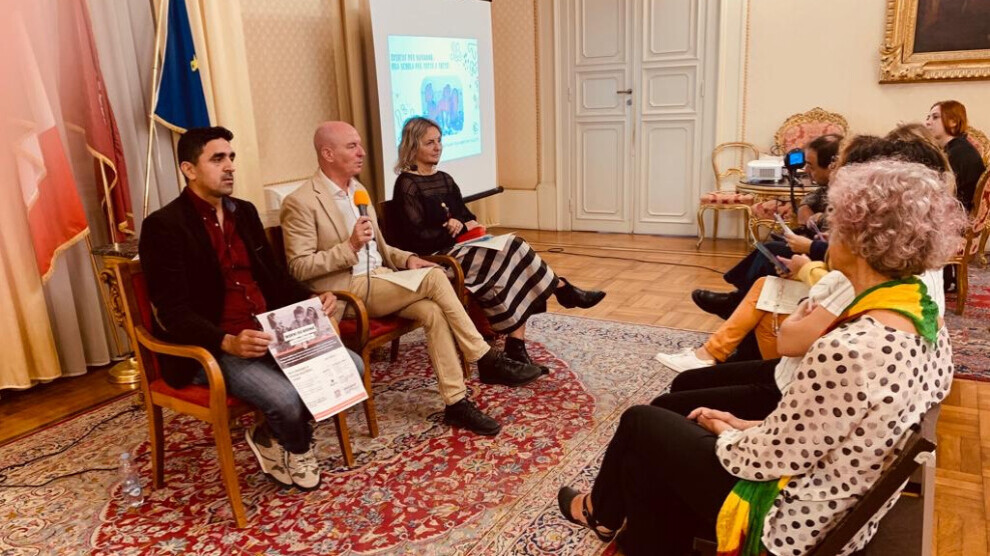Livorno Municipality and Heyva Sor launch joint project for Maxmur Camp
Livorno Municipality and Heyva Sor launched a joint project called "A School for Everyone" for Maxmur Camp.
Livorno Municipality and Heyva Sor launched a joint project called "A School for Everyone" for Maxmur Camp.

The Livorno Municipality and the Kurdistan aid organization Heyva Sor a Kurdistanê launched a joint project to build a school and playground in the Martyr Rûstem Cûdî Camp in Maxmur.
Mayor Luca Salvetti, Council Member Responsible for International Relations Barbara Bonciani and Heyva Sor a Kurdistan Italy President Alican Yıldız, attended a press conference organized to present the project.
Speaking at the meeting, Mayor Salvetti said: "There are concrete gestures that this city and this region make to show solidarity with those who are once again experiencing great difficulties. The project of a school for Maxmur is one of those concrete gestures."
The life of children in the camp, which can be defined as "detention" for all intents and purposes, is precarious and uncertain. It is not possible to predict what will happen to them in the immediate future, nor in the long term. The children residing in Makhmur do not enjoy a specific recognized status and are left without any assistance. However, we, as a humanitarian association and as a community of solidarity, cannot afford to look the other way. Our goal is to offer them a fair education, so that the International Convention on the Rights of Children and Adolescents is respected, according to which all young people have the right to education.
According to information provided by the Municipality of Makmur, approximately 200-250 babies are born in the camp every year. It is therefore estimated that every year at least 150 children will start nursery school.
The “CİHDİGRİN” school will welcome children from the surrounding villages and will guarantee a welcoming environment, dedicated teachers and professional psychological support.
Project Details:
The project is based on careful planning and well-defined objectives.
The “CİHDİGRİN” nursery school will host 150 children every year, distributed in five classes, with an average of thirty children per class.
Five qualified teachers, one psychologist/educationist and two security personnel will work constantly to ensure a stimulating and safe learning environment. The project also involves the creation of a garden and a playground, which will enrich the educational experience of minors.
Support the Project:
To carry out this ambitious project, we need your support! We have estimated a budget of $2,758 dollars per month for staff member salaries and compensation, with a minimum expected duration of six months. In addition to and before salaries, we must, however, cover the costs of construction and purchase of the necessary materials, equipment, furnishings and decorations, for a total of €120,000.
According to estimates by the Municipality that supervises the camp, the project will be completed in approximately six months, during which the construction of the structure, the garden and the playground, the interior decoration and the installation of air conditioning services will be completed and safe.
The Makmur camp is located in the heart of Iraqi Kurdistan. The community that resides here is predominantly made up of Kurdish people from the villages and hamlets of Van, Şirnex, Colemërg, Sërt, Cizîr, Qilaban, Silopi, Çele, Gever and Nisebin, in Turkey, close to Iraq. Between 1993 and 1994 the Kurdish population present in these territories suffered persecution, massacres and acts of torture, perpetrated so that they could submit to the Turkish government. The resistance to this imposition led to a very violent government reaction: through evacuations, fires and destruction of villages, people were forced to migrate towards Iraqi Kurdistan (northern Iraq). Saddam Hussein's regime, on the other side of the Zagros mountains in Iraq, attempted to disperse these refugees by proposing that they be divided and sent to various camps. When this proposal was rejected, the Iraqi government began moving the caravan from one place to another in the desert, resulting in the deaths of many people. In 1998, the caravan landed near the village of Makhmur and it was here that the camp took shape, being recognized by the UNHCR (United Nations High Commissioner for Refugees) as a place to welcome migrants. Those who began to reside there transformed Makhmur into a town, building infrastructure, schools, clinics and cultural centers, creating an autonomous community.
However, in recent years the pressure from the Turkish state has not eased and since 2019 an embargo has been imposed on Makhmur, a political move that has suspended and seriously undermined the fundamental rights of a completely innocent community. The thirteen thousand displaced residents are currently unable to leave the camp and provide for their life and health needs. Over the years, there have been many tragic episodes that have marked its permanence and many people have died, also due to limited access to healthcare.
Among the latest events, on 20 May 2023, the Iraqi army showed up at dawn at the gates of Makhmur, deploying armored vehicles and construction machinery around the camp, with the declared plan to surround it with barbed wire and observation turrets to effectively transform it into an open-air prison.
The project met with strong opposition from the local inhabitants, who immediately occupied the streets, preventing the army from approaching; after three days and numerous civilian losses, the Iraqi soldiers were forced to retreat. Finally, starting from the launch of a new bombing campaign led by the Turkish state and aimed mainly at Rojava, in the first days of October 2023 Makhmur was bombed and several people - including minors - were injured.